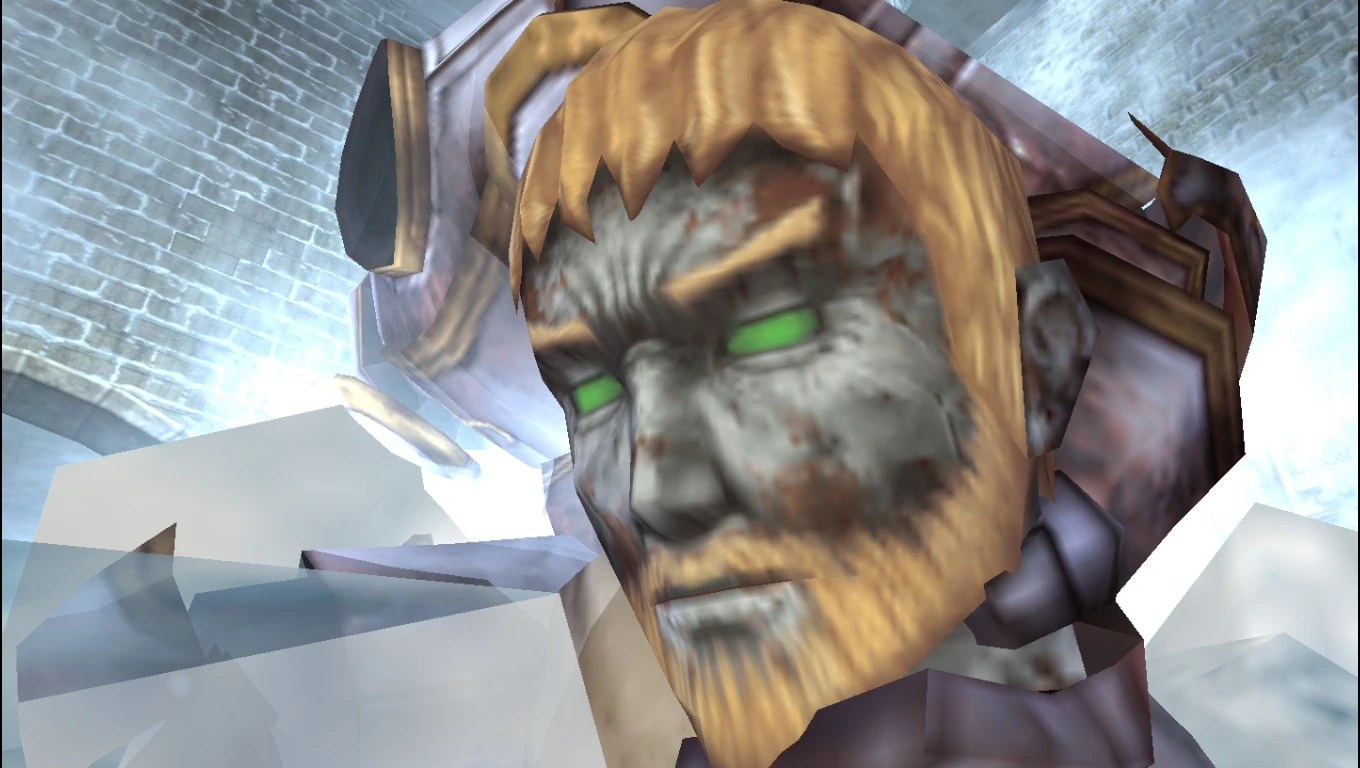 |
| Left: Cheesy. Right: Scary. |
I also love compilation re-releases for the simple fact that you're getting more than one game for the price of one and having them all in one package makes getting previous installments of certain games less of a hassle for newcomers.
 |
| With this, the Samurai Shodown Anthology and Orochi Saga Collection, I have 17 SNK games accross 3 disks. |
Castlevania Dracula X Chronicles for the PSP is a combination of both by having three games: A 3D remake of Castlevania: Rondo of Blood, the original version of it, and the extremely beloved Castlevania: Symphony of the Night, all from happier times before Konami lobotomized themselves. Like how Samurai Shodown 6 was first released in America through the Samurai Shodown Anthology, this is the first international release of Rondo of Blood and the only one until a Virtual Console port a few years later.
They probably could have said that Symphony of the Night is included on the front of the box to catch people's attention because many people regard it as the best Castlevania game ever made and one of the best games ever for the PS1. I never had that prior experience, but SOTN was definitely influential on the exploration-heavy Castlevania games I did play on the Nintendo DS: Dawn of Sorrow and Portrait of Ruin, both of which I love to death.
But Symphony of the Night gets the praise it does in part because it was released in America while Rondo of Blood wasn't. Rondo of Blood is considered by some to be a major turning point in the franchise, with a significant step up in the technology used, better level designs and anime-style cutscenes, however few, to convey a story. Since SOTN is a direct sequel to Rondo of Blood, packaging them together is a no-brainer. It forms a more complete story and has the two best classic Castlevania games together for maximum value.
Rondo of Blood is the story of Richter Belmont fulfilling his family's history of vampire slaying. As inevitable as the morning sun vanquishing the terrible night, Dracula, lord of darkness comes back to wreak havoc. This time, to get rid of his threat at the source, Dracula burns Richter's home to the ground and kidnaps four girls that can be found hidden through the game for a better ending. It's a basic story, but like a good fighting game like KOF, it has a beginning, middle and end, all nicely presented to serve as the framework for the ass-kicking action the game focuses on.
Since Rondo of Blood was made before Symphony of the Night helped invent the word "Metroidvania", it's a linear action game, but with an exploratory factor in the form of alternate pathways and the traditional shanks of meat hidden in walls that conveniently don't make you cough up debris.
Part of what makes Rondo of Blood such a good platformer is that most of the time it doesn't resort to platforming bullshit. Knockback from small enemies aren't much of an issue and few pits are bottomless. The only thing that can instant-kill you is a painting in one stage and water. The Belmonts do not have a history of swimming.
As per Castlevania's reputation, all the hardcore monster slaying is set to classic gaming music masterpieces. The system that the original Rondo of Blood was originally released for allowed for much more refined music tracks.
Through it all you're fighting bosses like Minotaurs, Dragons, Death and at one point the four bosses of the original Castlevania, all leading up to the battle with Dracula himself. It's the quintessential action game and what people think of when they think Castlevania.
The remake that's the centerpiece of this collection is more or less the same game. Item placements are different, but in terms of level design it's mostly just Rondo of Blood with enhancements to the presentation. The added power of the PSP allows for more detail in the environments where the original was lacking. It can look a bit like a high-end N64 game at times, but still looks impressive for the system.
Music is also remastered and redone, with many orchestral tracks replacing some of the original's rocking ones, but if you'd rather have the original's music, there's an option to change the assigned music tracks in the remake. That music can come from the remake, that's unlocked as you play, or from the other two games in the collection, which require finding music CDs hidden throughout the remake's levels (and through its boss rush mode). It's a neat little feature.
The remake takes the effort to add more to the story presentation too. There are a handful of added scenes of dialogue and every boss is given an introductory cutscene. The boss Dullahan shows this off the best. In the original version he simply walks into the empty room, while in the remake he bursts out of an icy prison.
As stated, it's mostly the same game, but the remake does include a few additions and changes, as most remakes do. Alternate stage 5 in the original version is regarded as one of the worst stages, even by the creator, so the remake completely redesigns it and adds a new boss battle where there wasn't one before. Another boss is added with the way the remake changes the end game. In the original game, you fight the ghost of the priest Shaft right before you fight Dracula. In the remake, that only happens if you rescue all the girls other than the second playable character Maria (she's optional). If you don't, you instead fight a vampirized Annette, Richter's fiance, who uses a swarm of bats as her means of attack and defense. If you fight her, it means you're getting the remake's new bad ending.
The remake's good ending that comes with rescuing all the girls gives Dracula one last six-winged form after his second, and it is one of the hardest Castlevania bosses that will ever be invented!
Whether you think the remake is superior to the original or not, it's nice that both versions of the game are included for both sides of that debate. The original even has a new English dub. It's fun seeing such an old game get an English dub with actors that can actually act, as opposed to the crappy English voice acting that was commonplace at the time of the game's creation.
Even without those two games, the Dracula X Chronicles still includes Castlevania: Symphony of the Night, a full-blown PS1 game regarded as the best Castlevania game ever made.
Taking place directly after Rondo of Blood, Symphony of the Night is the story of Alucard, first seen in Castlevania 3. Richter goes missing inside Castlevania and starts declaring himself its lord, so Alucard and Maria both fight their way through the chaotic maze-like castle to rescue him and figure out what's wrong.
It's a good framework. The number of actual scenes of dialogue can be counted on two hands, and I much prefer the DS games in that regard, but there's plot development and a legitimate twist midway through the game if you find the right items in the castle. The bigger story prominence and game-changing focus on exploration is what gives Symphony of the Night its notoriety. That and the awful localization.
Let's face it guys, the English dialogue sucked. Apart from maybe Alucard's voice, it's a source of ridicule that's only overlooked because the game itself is so good and the story is barely present for the vast majority of it.
Even the creator admitted the English dub was all around bad, and he doesn't speak English! The version of Symphony of the Night in this collection localizes the game the way it should have been in the first place, with a new English dub from the same actors as the other games in the collection. It is much easier to take seriously. Patrick Seitz is especially good as Dracula, perfectly matching his portrayal as a calm force of hedonism.
The ports of Symphony of the Night and the original Rondo of Blood are both great additions that substantially up the value of the whole package, but the ability to play them must be found within the remake, where most of the effort went. Whether or not that effort paid off is hard for me to say. It does so much better than the original thanks to its added bosses and story, but some of the additions, like the true final boss, hold it back. I don't dwell on it though, because the collection lets me play either version.
You can get the Dracula X Chronicles on the Vita for $15 on PSN. With three games included, that's about $5 a game. Since Symphony of the Night goes for $10 as a PS1 classic on PSN and Rondo of Blood is 900 Wii Points ($9) on the Wii Shop channel, the Dracula X Chronicles is the cheapest option with the added bonus of being portable. Action gamers will definitely want to get this one. I give Castlevania Dracula X Chronicles a 7 out of 10.

/revision/latest?cb=20150315142159)


No comments:
Post a Comment